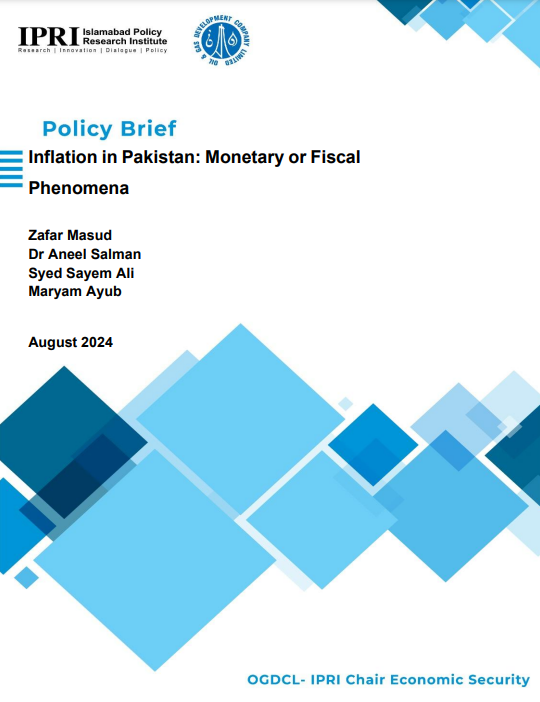Previous: Monetary Policy amid Post-COVID Inflation — IPRI Policy Brief Pt 4
Fiscal Stance of Government in Recent Inflationary Episode
The fiscal side of the country implemented fiscal consolidation which resulted in increased tax revenues. In FY2020-21, due to increased tax revenue and non-interest spending the fiscal deficit was reduced to 6.1% of GDP from 7.1% than previous year. Tax revenue showed a growth of 18.4% in FY2020-21. 1
At the end of June 2021, the total public debt amounted to Rs. 39, 861 billion. One of the reasons for debt accumulation was interest servicing. Domestic and external interest payments made by the government in FY2020-21 were Rs 1357 billion and Rs 118 billion respectively. 2 Secondly, the increase in cash balances of the federal government. 3
Given the central bank reserves declining to below the critical level of USD 5 million, the nation seeks an IMF Standby Agreement. Pakistan took fiscal measures set by the IMF to meet its budgetary needs. The last IMF SBA focused on helping the implementation of the FY24 budget, returning to a market-determining exchange rate and functioning of a foreign exchange market, maintaining tight monetary policy with the goal of disinflation, making progressive structural reforms especially relating to the SOE governance, energy structure and climate resilience. 4
The second and final review under the IMF concluded a USD 3 billion SBA. However, the authorities have stressed the cost side reforms for restoring the energy sector and agricultural recovery reforms.
In 2023, the debt servicing increased to 74% of FBR tax revenue. Due to few choices of funding debt servicing i.e. downgrading in credit rating by international agencies, 95% of the fiscal deficit is being financed by domestic banks leaving behind no money for private businesses.
In June 2024, the government presented a fiscal budget of PKR 81 trillion with an ambitious tax revenue target of 13 trillion. The government has targeted the collection of Rs 5.545 trillion through income tax revenue with a proposed hike in both direct and indirect taxes.
To achieve the revenue target, the government has imposed restrictions for non-filers including measures like blocking the Sims of non-filers, deducting 90% of their mobile recharge, and restricting them from travelling abroad. Increased corporate taxes for exporters, imposing a tax on domestic and foreign countries.
On the expenditure side, the current expenditure increased by 21% out of which 50% will go towards debt servicing, and salary hike of 25%, and a 15% increase for pensioners. 5
The government has shown interest in the development of infrastructure and public sector projects increasing by 50% compared to last year. However, the Budget has not targeted the sectors performing well in tax net including agriculture sectors, retailers, and real estate.
The investment climate is not good enough to attract foreign investors to the industry which is required to address the fiscal issues of the country. Pakistan’s high current account deficit, fiscal deficit, and trade deficits are contributing to the increased inflation.
Up next: Recent Inflationary Episode and the response of different countries — IPRI Policy Brief Pt 6
Inflation in Pakistan: Monetary or Fiscal Phenomena
IPRI — Islamabad Policy Research Institute
Policy Brief by
- Zafar Masud
- Dr. Aneel Salman
- Syed Sayam Ali
- Maryam Ayub
August 2024
OGDCL – IPRI Chair Economic Security
